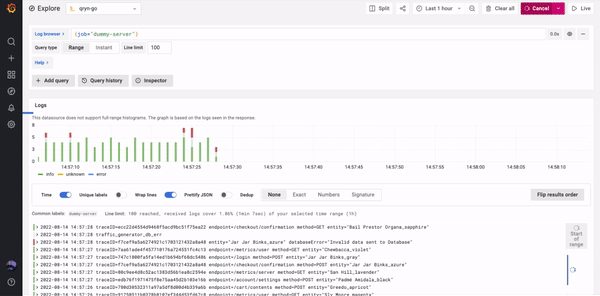
🚀 lighweight, multi-standard, polyglot observability stack for Logs, Metrics, Traces and Profiling
... it's pronounced /ˈkwɪr..ɪŋ/ or just querying
- Polyglot: All-in-one, Drop-in compatible with Loki, Prometheus, Tempo, Pyroscope
- Lightweight: Powered by Bun - the fast, all-in-one JavaScript runtime + ClickHouse OLAP Engine
- Familiar: Use stable & popular LogQL, PromQL, TempoQL languages to query and visualize data
- Voracious: Ingest using Opentelemetry, Loki, Prometheus, Tempo, Influx, Datadog, Elastic + more
- Versatile: Explore data with qryn's built-in Explorer and CLI or native Grafana datasource compatibility
- Secure: Retain total control of data, using ClickHouse, DuckDB or InfluxDB IOx with S3 object storage
- Indepentent: Opensource, Community powered, Anti lock-in alternative to Vendor controlled stacks
- Setup & Deploy qryn OSS using the documentation and get help in our Matrix room

- Looking for a minimal setup for a quick test? Start with qryn-minimal

💡 qryn independently implements popular observability standards, protocols and query languages
qryn ships with view - our zero dependency, lightweight data explorer for Logs, Metrics and Traces

⚡ qryn is officially integrated with opentelemetry supports any log, trace or metric format
Ingested data can be queried using any of the avialable qryn APIs (LogQL, PromQL, TraceQL)
💡 No modifications required to your opentelemetry instrumentation!
qryn supports native ingestion for Loki, Prometheus, Tempo/Zipkin and many other protocols
With qryn users can push data using any combination of supported APIs and formats
💡 No opentelemetry or any other middlewayre/proxy required!
Any Loki compatible client or application can be used with qryn out of the box
⚡ qryn implements the Loki API for transparent compatibility with LogQL clients
The Grafana Loki datasource can be used to natively browse and query logs and display extracted timeseries

🎉 No plugins needed
👁️ No Grafana? No problem! Use View
Any Prometheus compatible client or application can be used with qryn out of the box
⚡ qryn implements the Prometheus API for transparent PromQL compatibility using WASM 🏆
The Grafana Prometheus datasource can be used to natively to query metrics and display timeseries

🎉 No plugins needed
👁️ No Grafana? No problem! Use View
⚡ qryn implements the Tempo API for transparent compatibility with TraceQL clients.
Any Tempo/Opentelemetry compatible client or application can be used with qryn out of the box
The Tempo datasource can be used to natively query traces including TraceQL and supporting service graphs

🎉 No plugins needed
👁️ No Grafana? No problem! Use View
⚡ qryn implements the Pyroscope/Phlare API for transparent compatibility with Pyroscope SDK clients.
Any Pyroscope SDK client or Pyroscope compatible agent can be used with qryn out of the box for continuous profiling

qryn can ingest data using formats from Grafana, InfluxDB, DataDog, Elastic and other vendors.
With qryn and grafana everything just works right out of the box:
- Native datasource support without any plugin or extension
- Advanced Correlation between Logs, Metrics and Traces
- Service Graphs and Service Status Panels, and all the cool features

📚 Follow our team behind the scenes on the qryn blog
Whether it's code, documentation or grammar, we ❤️ all contributions. Not sure where to get started?
- Join our Matrix Channel, and ask us any questions.
- Have a PR or idea? Request a session / code walkthrough with our team for guidance.
©️ QXIP BV, released under the GNU Affero General Public License v3.0. See LICENSE for details.








